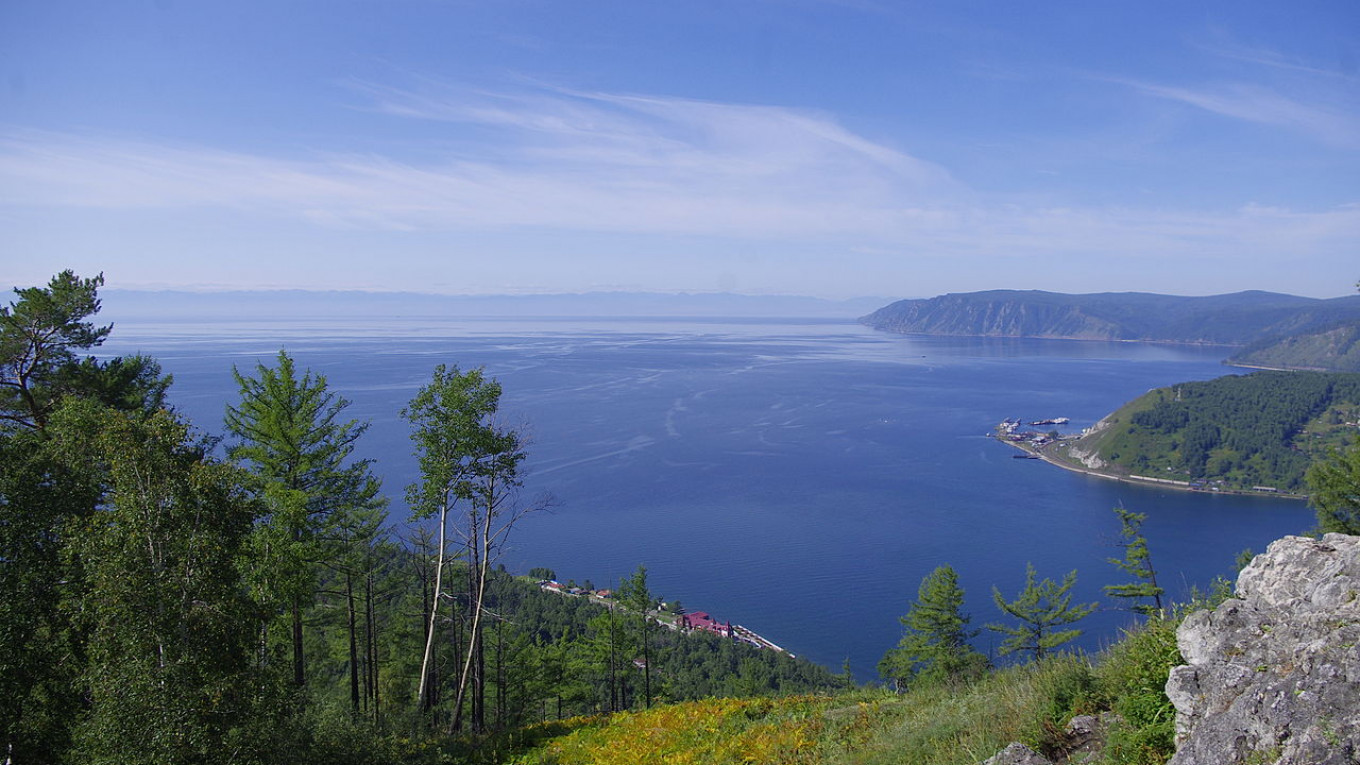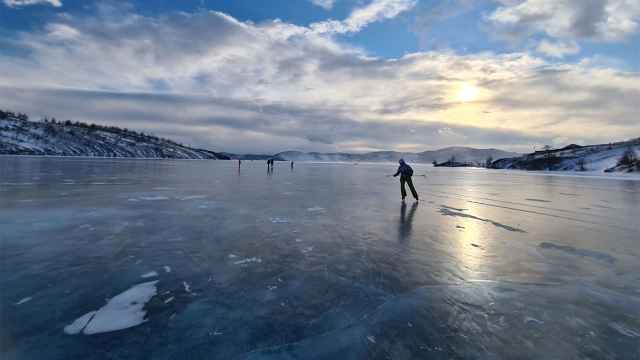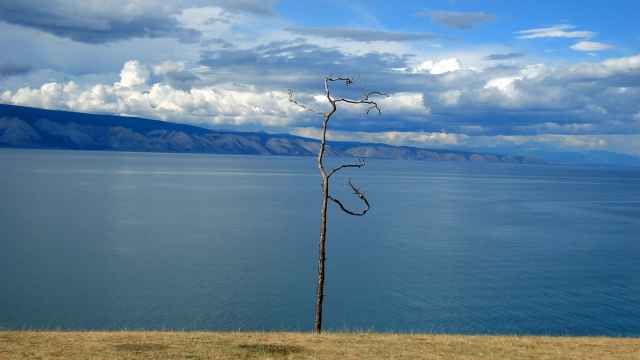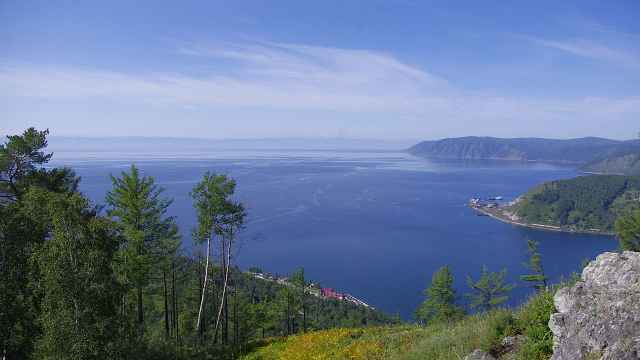On Jan. 1, the Russian government is set to significantly reel back important environmental regulations protecting Lake Baikal, the world’s largest freshwater lake that is home to creatures found nowhere else on earth.
It’s a move that could lead to the biggest environmental crisis in Baikal’s history, environmental experts and activists say. With the clock running out, they’re pushing back against the government to restore the lake’s protections before the New Year.
“The amendments to the key regulations pushed now by the [natural resources] ministry and lobbyists will greatly exacerbate this crisis and may seriously degrade the already weakened lake ecosystem,” Eugene Simonov, a coordinator of the Rivers Without Borders international coalition, told The Moscow Times.
Despite protests from environmentalists, the previous list of prohibited activities in the Baikal area was abolished earlier this year, leaving the government less than two weeks to approve new rules before Jan. 1. Otherwise, there will be no remaining environmental protections at the start of 2021.
Last week, the new list of protections was considered by a Government Commission on Administrative Reforms subcommittee, the Natural Resources and Environment Ministry told The Moscow Times.
According to the latest draft provided to The Moscow Times, the revised list will allow commercial clearcutting; development projects which pose a high risk previously untouched areas and water protection zones; and waste incineration from next year.
The ministry told The Moscow Times that the paragraph on commercial clearcutting will be changed to prohibit such activity.
Still, “there is no scientific justification behind the proposed changes,” said scientist Irina Orlova, a secretary of the scientific council on Lake Baikal problems for the Russian Academy of Sciences’ Siberian branch.
The scientific council includes over 40 Russian scientists who provide expertise and formulate positions on proposed issues.
Members of the council say that many of their fundamental suggestions have largely been ignored by the Natural Resources and Environment Ministry in a recent reversal, although some compromises have been reached through lengthy negotiations.
Located in southeast Siberia, Lake Baikal is the world’s deepest and oldest lake as well as the world’s largest lake by volume, containing about 20% of the world’s unfrozen freshwater reserve.
UNESCO added Lake Baikal to its list of World Heritage Sites in 1996. One of the conditions for its World Heritage status was legislation in Russia granting environmental protections to Lake Baikal and its surrounding regions. This act, which went into effect in 1999, divides the territory into three zones: the central ecological zone, the zone of atmospheric influence and the buffer ecological zone.
In order to fulfill UNESCO’s conditions, Russian lawmakers created “The List of Activities Prohibited in the Central Ecological Zone of the Baikal Natural Territory,” which put limitations on what industries and land usages are allowed at the World Heritage Site.
This decree, also known as resolution 643, was adopted in 2001 but actually came into force in 2006 when the central ecological zone boundaries were also established.
The Russian government recently started adopting a regulatory guillotine mechanism to revise certain acts and cancel unnecessary ones. However, the guillotine also abolishes regulatory acts adopted before 2020.
As a result, the current version of resolution 643 will simply fall under this regulatory guillotine on Jan. 1, 2021.
The news led to mounting frustration among the public, with over 11,000 negative reviews submitted on the regulation.gov.ru portal over the dissolution of resolution 643. In response, the Natural Resources and Environment Ministry formed an official working group of experts to create a new list of protections in a series of closed meetings. Members of the Russian scientific community, environmentalists, bureaucrats and certain businesses have spent a year in discussions as the document went through several revisions.
“We agreed on some things: we managed to cancel clearcuttings and the clause about investment projects,” said Mikhail Kreindlin, head of Greenpeace’s protected areas program and a member of the working group. “But on many issues, including waste and building in the unaffected territories, it was not possible to reach an agreement.”
The latest edition of the list includes controversial points not discussed at any previous meetings, several members of the official working group told The Moscow Times.
“On Nov. 30, a completely different list appeared, which canceled most of what we agreed on, including that prohibitions won’t apply to railway transport facilities,” Kreindlin said.
Allowing construction in the water protection zone was the point that most alarmed experts.
“We believe that construction in the water protection zone bears high risks for the Lake Baikal ecosystem,” Orlova, also a member of the working group, said.
When asked about this specific point, the Natural Resources and Environment Ministry told The Moscow Times that “construction in the water protection zones is allowed only within city limits, taking into account the restrictions established by the Water Code as well as restrictions in the form of a ban on construction in flooded zones.”
Simonov countered that this will have little effect in reality, as municipal areas around Lake Baikal are gradually expanding.
“In 2017, the authorities drastically reduced Lake Baikal’s water protection zone, with a promise to strictly protect what was left. Now this requirement is being removed for zones included in settlements,” he said.
The ministry also rejected a proposed clause to prohibit development in “untouched natural habitats.”
Members of the working group raised concerns over a provision in the latest draft list that would grant construction permits for an unlimited period of time to backbone infrastructure facilities from the top two hazard levels that are built from 2021-2024.
“A strange point appeared in the latest edition regarding the fact that constructions will not be required to comply with the regulations on prohibited activities, including the construction of objects of the first and second categories of danger,” Orlova told The Moscow Times.
For example, nuclear power plants, cement plants, large chemical plants and large metallurgical plants all fall under the Russian legal classification of hazard categories 1 and 2, Orlova explained.
Orlova said that developing the revised list is so contentious because of the high stakes it will carry for a wide variety of groups.
“Of course, this is important for the environment, for the population, for large businesses— for everyone. When there are many opinions, the issue is not so easy to settle,” Orlova said.
As of Monday, close to 75,000 people have signed a petition to Prime Minister Mikhail Mishustin in protest of the latest draft list of prohibitions.
But as commercial and environmental interests clash in the battle over the possible restrictions, the future health of Lake Baikal’s ecosystem remains in question.
“Russian society and the international community should know that Lake Baikal is experiencing an acute ecological crisis largely caused by mismanagement in sewage treatment, coastal development, wildfires and water resources regulation,” Simonov said.
A Message from The Moscow Times:
Dear readers,
We are facing unprecedented challenges. Russia's Prosecutor General's Office has designated The Moscow Times as an "undesirable" organization, criminalizing our work and putting our staff at risk of prosecution. This follows our earlier unjust labeling as a "foreign agent."
These actions are direct attempts to silence independent journalism in Russia. The authorities claim our work "discredits the decisions of the Russian leadership." We see things differently: we strive to provide accurate, unbiased reporting on Russia.
We, the journalists of The Moscow Times, refuse to be silenced. But to continue our work, we need your help.
Your support, no matter how small, makes a world of difference. If you can, please support us monthly starting from just $2. It's quick to set up, and every contribution makes a significant impact.
By supporting The Moscow Times, you're defending open, independent journalism in the face of repression. Thank you for standing with us.
Remind me later.







